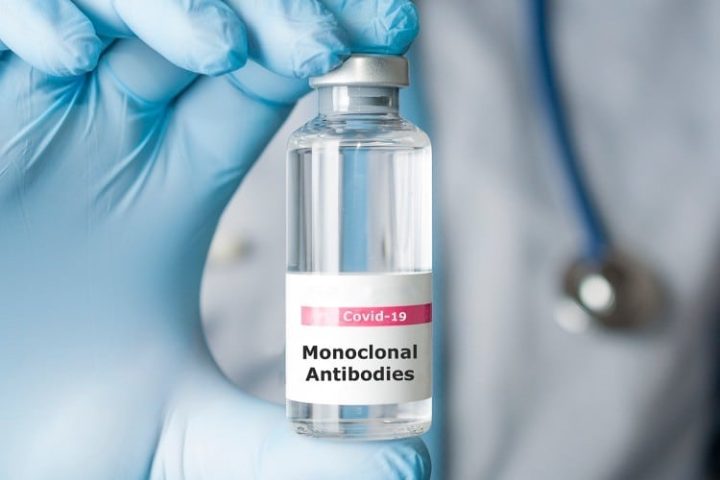
Texas Governor Greg Abbott is following in Florida Governor Ron DeSantis’ footsteps, announcing his state has obtained its own supply of monoclonal antibodies and is no longer beholden to the federal government for the much-needed COVID treatment.
“Texas has obtained its own separate allocation of these monoclonal antibody treatments working around the limitations that President Biden has put on us so that we will be able to ensure that anybody in the state of Texas that wants access to these special treatments, that they will be able to get it,” Abbott, a Republican, told radio host Dana Loesch.
The Texas Department of State Health Services told media outlets it has received more than 4,000 doses of the antibody treatments from GlaxoSmithKline, and patients simply need to get a referral from their doctors to be eligible for the treatment.
The announcement comes after the Biden administration declared earlier this month it would be rationing the government’s supply of the monoclonal antibody treatments. The Department of Health and Human Services (HHS) said states with low vaccination rates that have been placing large orders of the antibody treatments must reduce their orders by 30 percent. According to a statement by White House Press Secretary Jen Psaki, seven states “are making up 70 percent of the orders,” and the goal of the White House is to enable “equitable” access to the treatments.
But critics of the Biden administration are skeptical that the move is anything more than an attempt by Biden and his fellow Democrats to deliberately create a shortage in order to offer a solution that both conveniently punishes their political opponents and pushes their vaccine agenda.
Biden’s announcement prompted Kentucky’s Democratic Governor Andy Beshear to warn “vaccine hesitant” residents that they should not rely on the availability of the monoclonal antibody treatments.
“What this shortage ought to tell you is that if you’re unvaccinated and you get really sick, not only might there not be a bed in the hospital for you because they are so full, but that monoclonal antibody treatment might not be there for you either,” Beshear said.
And there it is. Creating a shortage of monoclonal antibody treatments is a thinly veiled effort to use fear tactics to convince the unvaccinated that there will not be a viable treatment available if they were to contract COVID.
Coincidentally, the policy adversely impacts Biden’s political opponents. Biden even went as far as to directly call out the governors of Texas and Florida earlier this month for “undermining” his vaccine agenda.
“The governors of Florida and Texas are doing everything they can to undermine the life-saving requirement that I proposed,” he said.
Predictably, Florida and Texas are two of the seven states most affected by the new restrictions.
No stranger to confrontations with the Biden administration, DeSantis was the first to announce he would be circumventing the federal government’s new policy to work directly with the manufacturers for the treatment. He has been a vocal proponent of the monoclonal antibodies, which significantly reduce the effects of COVID-19 and prevent hospitalization when administered early in the onset of the virus. According to the Tampa Bay Times, high-risk patients treated with the antibodies are “a third as likely to be hospitalized as similar patients given a placebo.”
DeSantis opened 25 monoclonal antibody sites across the state to serve up to 300 patients per day. But Biden’s newly announced policy to allot the drugs based on usage numbers and case rates could force some of those sites to close, DeSantis said during a news conference in Tampa last week.
DeSantis said last week, according to NBC Miami, that the federal government is expected to send less than 18,000 doses of Regeneron’s monoclonal antibodies this week, a dramatic reduction from a few weeks ago, when the government was sending Florida more than 40,000 treatments per week.
DeSantis has secured thousands of doses of antibody treatments from GlaxoSmithKline in an effort to close some of the gap, NBC Miami reported. He continues to call upon the Biden administration to restore Florida’s supply of treatment.
“We should be doing everything we can to get patients monoclonal antibody treatments, not cutting allocations of treatment like the Biden Administration has done,” he said in a statement issued last week. “Despite the cuts by the federal government, we want any Floridians that could benefit from this treatment to have access to it. Florida is going to leave no stone unturned when finding treatment for our state, and we are encouraged to have secured a shipment of monoclonal antibody treatments from GlaxoSmithKline.”
According to Dr. Larry Antonucci, CEO at Lee Health, DeSantis’ monoclonal antibody program “has really been a game changer” in Florida. The treatments, he said, are reducing hospitalizations in Florida.
To undo the HHS policy at the congressional level, Senator Marco Rubio (R-Fla.) proposed legislation this week to stop the agency from creating rules that block healthcare providers and hospitals from purchasing the treatments directly from distributors and manufacturers, Yahoo News reported. Republican Senators Marsha Blackburn of Tennessee, Rick Scott of Florida, Kevin Cramer of North Dakota, and Roger Marshall of Kansas are co-sponsoring the bill, titled the Treatment Restoration for Emergency Antibody Therapeutics (TREAT) Act.
“This abrupt change in policy from the Biden administration is nothing but an attempt to punish Florida,” Rubio told Fox News in an e-mail statement. “We cannot let vindictive, politically motivated actions by this administration jeopardize the health and safety of Floridians and others.”
“My bill would bring back fairness by allowing hospitals and other appropriate health care facilities to directly access this life-saving treatment from manufacturers,” Rubio asserted.




